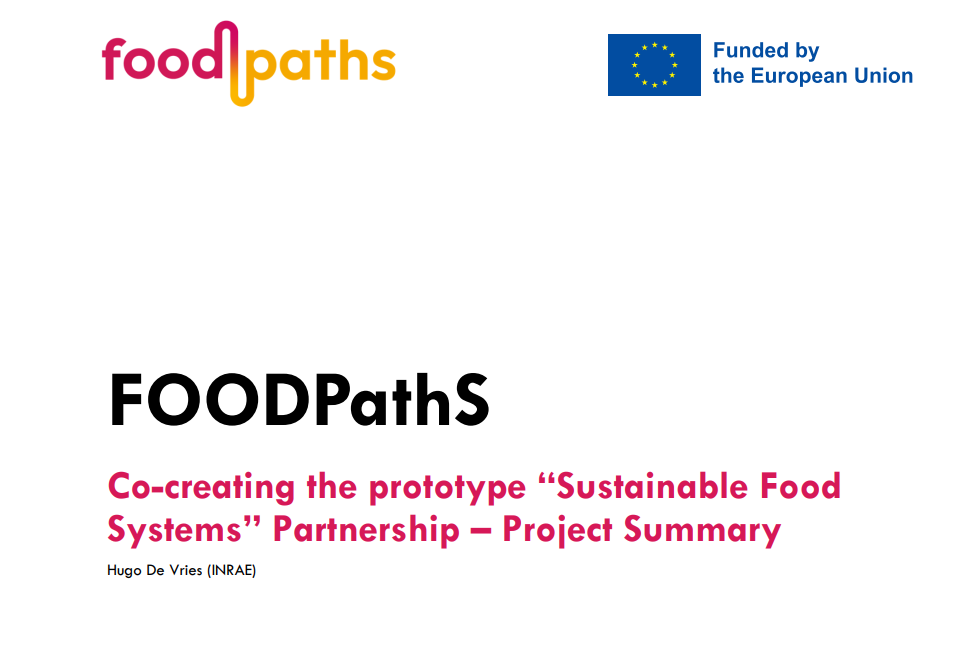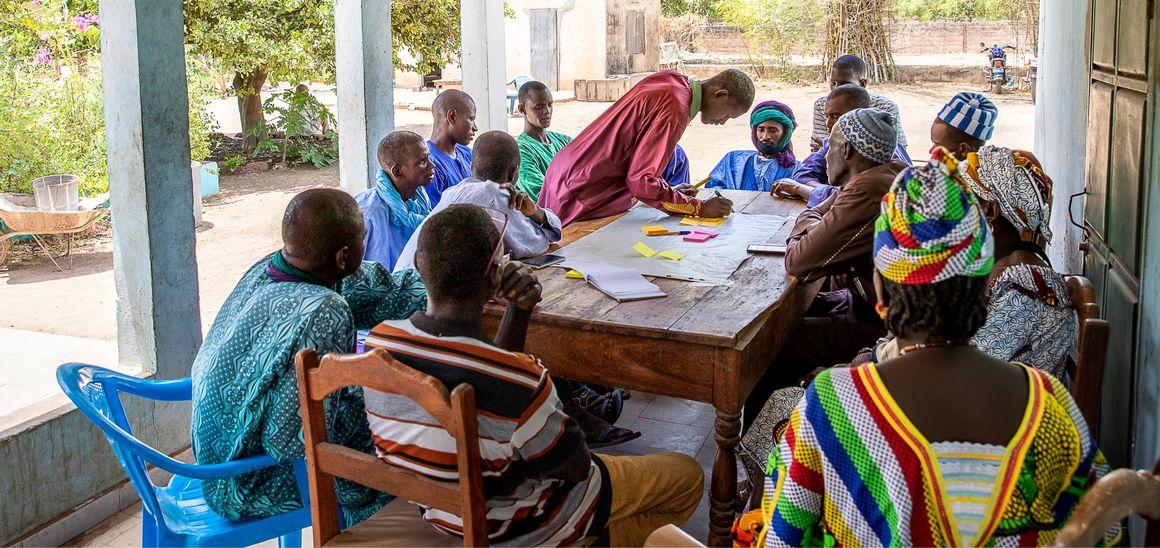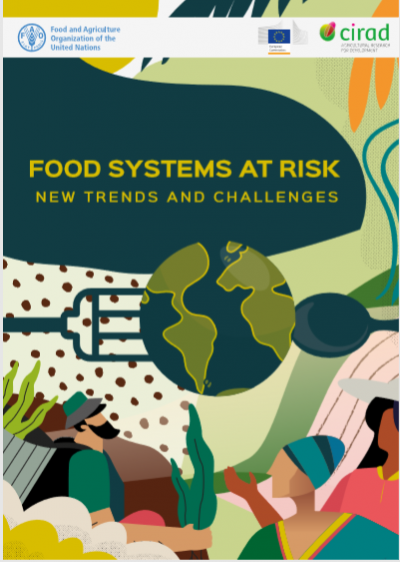SASi-SPi is a social-sciences, economics in particular, driven project and is primarily open to each of the 35 AGRINATURA member organisations, of which SLU is one. The project management unit is responsible for the coordination and implementation and is led by SLU.
Previous food systems assessments
The food systems assessments (FSA) were based on a systemic approach that took into consideration food systems as a whole and examine the many interactions across four key sectors: nutrition and food security, economic well-being, territorial equity, and environmental protection.
- The FSA started with 8 pilot countries (Bhutan, Burkina Faso, Colombia, Dominican Republic, Madagascar, Malawi, Nepal, and Senegal) and was extending to over 50 countries.
- The assessments triggered a participatory process involving around 20 researchers from CIRAD, almost 300 FAO consultants and teams of consultants from each of the 50-odd countries, in addition to national institutional focal points and civil society. The approach facilitated knowledge sharing between national and international experts.
- In the context of the 2021 UN Food Systems Summit (UNFSS), the methodology was first applied by the eight candidate countries, and subsequently extended to more than 40 others.
"The aim was to help stakeholders build a shared vision of the issues surrounding food system sustainability and foster systemic, intersectoral debate in order to support public policy building. Our crosscutting analyses in eight countries revealed more similarities - in terms of food system functioning and sustainability challenges - between territories in different countries than between those in a given country. This highlights the need to rethink food system pathways on a territory scale, not just on a national scale. To be able to conduct the usual disciplinary and thematic analyses, pinpoint truly transformative levers for action and progress in terms of building strategies and action plans, these assessments must be continued in a participatory way within territories." Ninon Sirdey, economist at CIRAD and co-coordinator of the Food System Assessment (FSA) project.
The Food Systems assessment in EU partner countries where FNSSA was a sectoral priority, were built on the lessons learned in terms of sectoral inclusiveness (e.g., health, education, social affairs, transport, energy) and interaction needed across regional, national, provincial, municipal, community multiple levels.
Assessment of the assessments
Various interviewees, from the government, the EU delegation and member states as well as other development partners, expressed their appreciation for it. The two-day virtual multi-stakeholder webinar and draft findings are considered useful. With the food systems roadmap having been adopted in 2021, this assessment was considered to help maintain momentum to move on its implementation, and a useful advocacy tool moving forward. (page 58)
The FAO CIRAD food systems assessments were meant to inform the round of programming (2021-2027). Delays and concerns over the quality of some of these assessments prevented the full exploitation in use by the EUDs.
There were interesting efforts undertaken by the African Forum on Agricultural (AFAAS), funded through the DeSIRA CAADP-XP4 programme, that aim to capitalize on experiences in research and innovation projects through the Country Fora AFAAS has established.
"While the first 8 reports were based on a participatory process in the respective countries, the following reports were mainly written by consultants: too quickly offered and too readily accepted. There was little effort at strengthening domestic actors’ capacity. Possibly, formulation, capacity development, consultation and dialogue efforts could have been better harmonised " INTPA Anonymus
Aimed at informing dialogues, these assessments analysed interlinked issues related to food security, nutrition, and health; inclusive economic growth; equity and territorial balance. Emerging findings were captured in a synthesis brief released in September 2021 which outlined two key points (see: EC (2021). Food Systems Assessment. Working towards the SDGs. Interim Synthesis Brief. September 2021.):
- the need to better consider the influence of drivers such as political stability, policy, fair governance, demography, education, and infrastructure and
- the need to embrace a broader multi- sectoral approach involving health, education, social affairs, transport, and energy services operating from national to community level. (page 128)
The breadth and depth of next assessments are currently fine-tuned to better equip EU Delegations with the information necessary to address SAFS transformation. (page 129)
European Commission, Directorate-General for International Partnerships, Engel, P., Slob, A., Laanouni, F., et al., EU support to sustainable agri-food systems in partner countries 2014-2020, Publications Office of the European Union, 2022, # 108 p- Maintain a clear strategic focus at country and regional level on the most vulnerable food system actors, namely, small producers, women, youth and small and medium-sized enterprises. This entails combining diverse instruments and support modalities in country portfolios, including social protection measures, to improve community resilience and strengthen support along the entire value chain.
- Develop a common understanding of context-specific challenges and opportunities at country and regional level, by supporting joint agri-food systems’ assessments and strengthening the use of foresight and scenario studies and political economy analyses. This would enable the joint identification of the most promising entry points for supporting sustainable agri-food system-level changes.
- Consolidate mechanisms that allow for learning from experience within the EU and from EU joint efforts to support sustainable agri-food systems at the national, regional and global level (R3 .3), especially to learn from the broad range of bottom-up programming instruments already developed by EU partners both inside and outside Europe. (page 10-11)
Example: Kenya
There is no complete and recent agri-food systems assessment available for Kenya, although several studies have been done at sub-national level. FAO initiated a food-systems analysis in 2021, but the approved report was not yet available for the evaluation team (April-July 2022). The team derived key features of the country’s agri-food systems from the various Government of Kenya (GoK) and international organisation documents. (page 58)
A striking observation is that most documents do not present a multi-sectoral and multi-dimensional approach in line with a food-systems approach, but rather a more sectoral approach. More comprehensive integrated analyses can sometimes be found, but only at sub-national level. This includes the ECDPM study on Nakuru county. (ECDPM (2021). Understanding and managing trade-offs in food systems interventions: the case of Nakuru county, Kenya. February 2021). (page 58)
While there are many partial assessments of important issues related to sustainable agri-food systems, some overarching issues are not very openly debated yet, such as Kenya’s population growth in relation to carrying capacity (especially in ASAL areas), and the rapidly increasing competition for scarce natural resources with conflicting interests of bigger agro-entreprises and smallholders. In addition, the co-existence of large ranches skived off as Conservancies and the rights of herders to pasture is an emotive subject and has been the trigger for conflict in various parts of Kenya, particularly in Laikipia Country. (page 62)
SASi-SPi
- Policy support for the EU (DG-INTPA) through its wide-ranging multidisciplinary scientific expertise in terms of food system inclusiveness and sustainability.
- Building new narratives and frames of reference to support the transition to sustainable food systems. Crosscutting studies will be conducted of the priority topics identified by the food system assessments, such as agroecology and pastoralism.
- Constructing models to support the transition to more sustainable food systems, based on participatory, scientific decision-making processes. Those models will be tested empirically in several territories in three candidate countries (Sierra Leone, Colombia and Bhutan), on a "transition challenge" pinpointed by the government.
"The SASI-SPI project intends to generate collective intelligence on various scales, to inform and support the transition to more sustainable, more inclusive food systems", Isabelle Vagneron, economist and CIRAD correspondent for the project, stresses.
Interview (20/04/2023) with Professor Kostas Karantininis about SASi-SPi:
"The SASI-SPI project is deeply a policy project. What makes it even more attractive is its direct and engaging nature. We will be providing 'intelligence' in short and long notice, at country level and broad themes, directly to policy makers, primarily in Brussels and in the intervention countries in the South (Africa, Asia and Latin America). Together with our FAO partners we will be one "intelligence" and science support mechanism for the European Commission on issues related to agri-food systems transformation, sustainability and climate change. The activities will be cross-cutting and bring together researchers, policy makers and agri-food system stakeholders to generate applied knowledge, and policy support"
"This is not a research project per se. Yet it is founded on research, and it provides ample room (and funding) for research, especially through the part led by SLU and coordinated by the SLU Department of Plant Breeding. This part is about generating narratives and reference frameworks on key thematic issues, policy options, institutional processes and trade-offs informing the transition to sustainable aquatic and agri- food systems." Professor Rodomiro Ortiz, Department of Plant Breeding, SLU
SASi-SPi work streams
The Project Management Unit is responsible for the coordination and implementation. Led by the Department of People & Society, SLU. Professor Kostas Karantininis, is the project director.
- Provides fast-track intelligence within 72 hours upon request – twice per month. Led by the French agricultural research and cooperation organization working for the sustainable development of tropical and Mediterranean regions (CIRAD).
- Develops intelligence on four cross-cutting themes and will establish Science-Policy Labs to test and implement policy recommendations. Led by the Department of Plant Breeding, SLU. Professor Rodomiro Ortiz, SLU, is the coordinator.
- Works in close collaboration with the FAO team and the corresponding European Commission delegations on three countries. So far, Sierra Leone, Colombia, and probably Bhutan have been selected. Led by CIRAD, France.
- Provides communication in site and overall, for the project. Led by iCRA.
Additional References
Sirdey Ninon, David-Benz Hélène, Deshons Alice. 2023. Methodological approaches to assess food systems sustainability: A literature review. Global Food Security, 38:100696, 11 p.
https://doi.org/10.1016/j.gfs.2023.100696
David-Benz Hélène, Sirdey Ninon, Deshons Alice, Orbell Claire, Herlant Patrick. 2022. Cadre conceptuel et méthode pour des diagnostics nationaux et territoriaux - Activer la transformation durable et inclusive de nos systèmes alimentaires. Rome : FAO-CIRAD, 70 p. ISBN 978-92-5-135754-5 ; 978-2-87614-773-7 https://doi.org/10.4060/cb8603fr
Upcoming event:
3 October (11-12 CET). EU Case studies on co-creation for sustainable food systemsExamples of how different stakeholders are collaborating in Europe for sustainable food systems.
This SFSN monthly workshop will host Hugo de Vries, research director at INRAE and task leader in the SCAR Working Group on Sustainable Food Systems. His presentation of the case studies mapped by the EU project FOODPaths will be followed by a networking session where you will be able to interact and pitch case studies that might have gone unnoticed until now.

- See more info here
- Register in this link: https://us02web.zoom.us/meeting/register/tZYpceCvqDIoHtG1Xe8AVsNHpwjsGx7IeieG








No comments:
Post a Comment